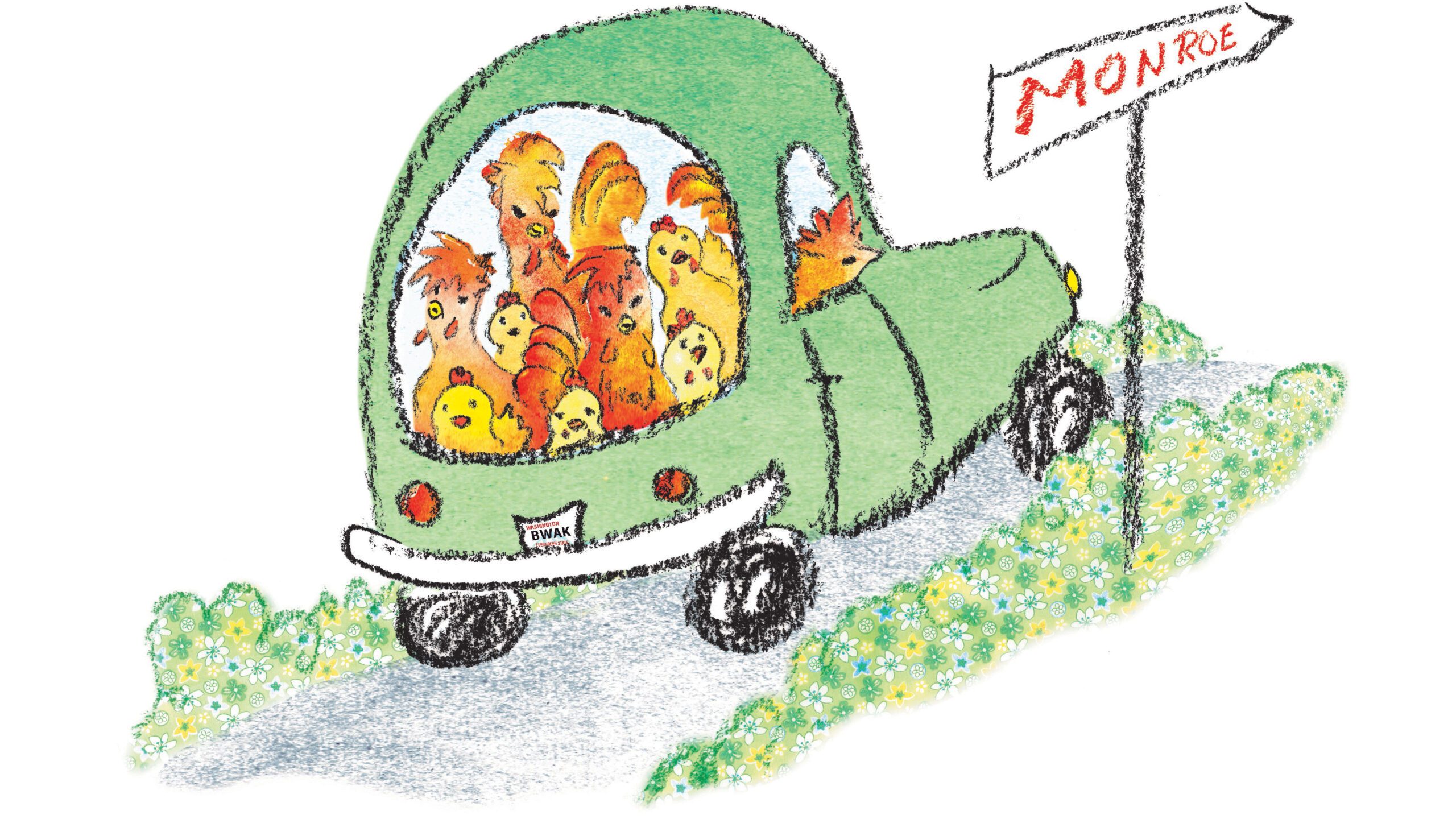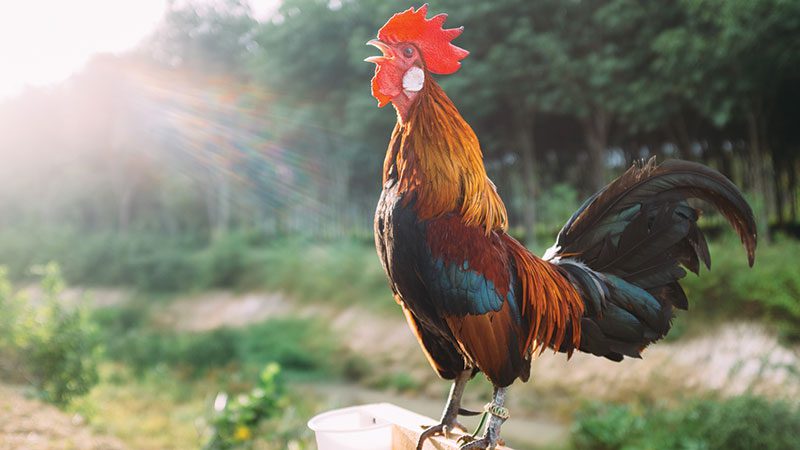Count your chickens…
This article was originally published in July 2022
and trade in unwanted roosters at this farm co-op
By Tara Austen Weaver, guest contributor

I don’t remember the first time I heard of the chicken trade-in program at Monroe Farm Co-op. It’s the sort of thing that gets whispered from one urban chicken owner to another—a fairly reasonable solution to the perennial problem of raising chickens in the city. In short: what do you do with unwanted roosters? Due to animal code restrictions, raising male chickens in the city is not allowed.
Most people purchase chicks at the stage when they are small and fluffy, when it is difficult to judge whether they will be an egg-laying hen or a noisy, flock-guarding rooster. The majority of baby chicks, whether ordered directly or bought from hardware or feed stores, start their lives in large hatcheries where chicks are “sexed” upon hatching.
This process reduces the number of roosters that are sent out into the world (if you order from a hatchery, they do indeed arrive in the mail). But chicken sexing is not an exact science and the hatcheries only guarantee 90% accuracy. In the spring of 2020, when we ordered 20 baby chicks from a hatchery to replenish our flock, we hit 90% exactly: 18 hens and two roosters.
We tried to keep all the birds. Raising baby chicks means you generally grow attached to them. We live on a block where four other neighbors have chickens, and there have been illegal roosters in our neighborhood before without complaint. Roosters can be noisy, but they play a role in a flock: good ones will help protect the hens, and give you fertilized eggs if you want to breed your own baby chicks.
Roosters can also take to bullying or harming hens, however, and two roosters in the same flock often does not go well. When our two roosters began to fight—with each other, and with the lower ranking hens—it was clear the time had come for a better solution. Enter the Monroe Farm Co-op and their chicken trade-in program.
The co-op is one of a pair of sibling stores (the other is in Snohomish) that cater to the farming communities in which they are located—selling everything from horse feed, fertilizer, bales of hay, and supplies for rabbits, chickens, geese and more. I had been there once before, to purchase feeders and watering equipment for our baby chicks. This time I was going back with grown chickens in tow—the pair of adolescent roosters, housed in a large dog crate in the back of my station wagon. While the boys were often rambunctious, in these new surroundings they acted docile, as if they knew it was their poor behavior that had landed them in the doghouse.
The chicken trade-in program allows you to re-home your hen, rooster, goose or turkey. The program started when the store was under previous ownership, a response to the number of people needing to offload various types of poultry (the store was purchased by the farm co-op organization in 2014 and renamed).
“We get a lot of birds coming through here,” says Emma Anderson, who serves as store lead for the co-op. According to records, the prior six months had seen 951 chickens turned in (791 roosters and 160 hens), with additional turkeys and ducks.
When I first heard about the trade-in program, I assumed this was a way for city folks to get rid of their roosters—and those roosters would generally end up in soup pots on the stoves of families who were accustomed to slaughtering their own meat birds. The classic French dish coq au vin, after all, evolved as a way to make use of spare roosters, also called cocks or cockerels. It might be nice to think that birds who are traded in live out their days on a farm in the country, but it seemed unlikely given the circumstances. According to Anderson, however, it does happen.
“We have a lot of customers who just like roosters and hens and think they’re cute and pretty and want to save them,” Anderson explains. She says a lot of the chickens they get are Bantams—a dwarf variety—because they are what is called a “straight run” (straight run breeds are impossible to accurately sex, so the chance of getting a rooster is 50/50).
“We also get a lot of people who are moving and want to get rid of their whole flock,” she says.
While some of the turned-in chickens are indeed headed to the soup pot, the co-op charges a small fee for the birds—$5 for a small rooster, $10 for a large rooster or hen, and $20 for a turkey or duck. It’s not a free source of protein. When I point out to Anderson that the grocery store will sell you a hen for a similar price and without the effort of harvesting it, she explains that some people prefer the quality of fresh meat.
In the decade I’ve been tending chickens, I’ve had to put down a bird that was injured beyond repair, but harvesting my own meat is a step beyond what I feel comfortable with at this point—both emotionally, considering these are animals I’ve gotten to know, and logistically, as I don’t have the gear or knowledge required to prepare the meat for consumption.
This is why I’m exceedingly glad to have a resource such as the co-op trade in program, for myself and others. During the urban farming boom that coincided with the beginning of the Eat Local movement and the 2008 recession, I heard stories from friends who live out in the country of waking up to find spare roosters wandering around rural areas where they had been dumped by city folks who were getting into backyard chickens.
The farm co-op seems a much better solution.
When I pull into the parking lot I find a large, clean coop divided into three sections and, with the help of a co-op employee, get the two roosters settled in an empty pen. They are young, healthy birds—whether they end up living their lives in a backyard or farm outside city limits where they can crow to their heart’s delight, or they end up feeding someone and their family, it’s a better end than I could currently give them.
Seattle writer Tara Austen Weaver is author of several books, including “Orchard House: How a Neglected Garden Taught One Family to Grow,” “Growing Berries and Fruit Trees in the Pacific Northwest,” and “A Little Book of Flowers, Peonies and Dahlias.”

Chicken returns
The chicken turn-in program operates year-round, though occasionally shuts down in winter at times of extreme cold. The Monroe Farm Co-op is open daily (there is no chicken trade-in program at the Snohomish location).
18422 Cascade View Dr.
Monroe, WA 98272
360-794-4663
